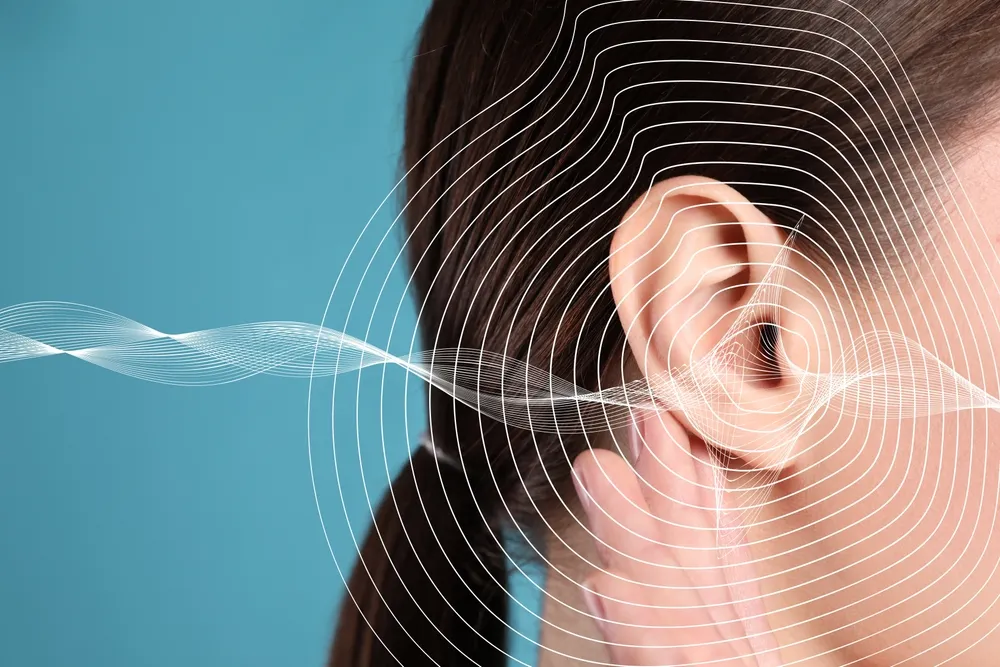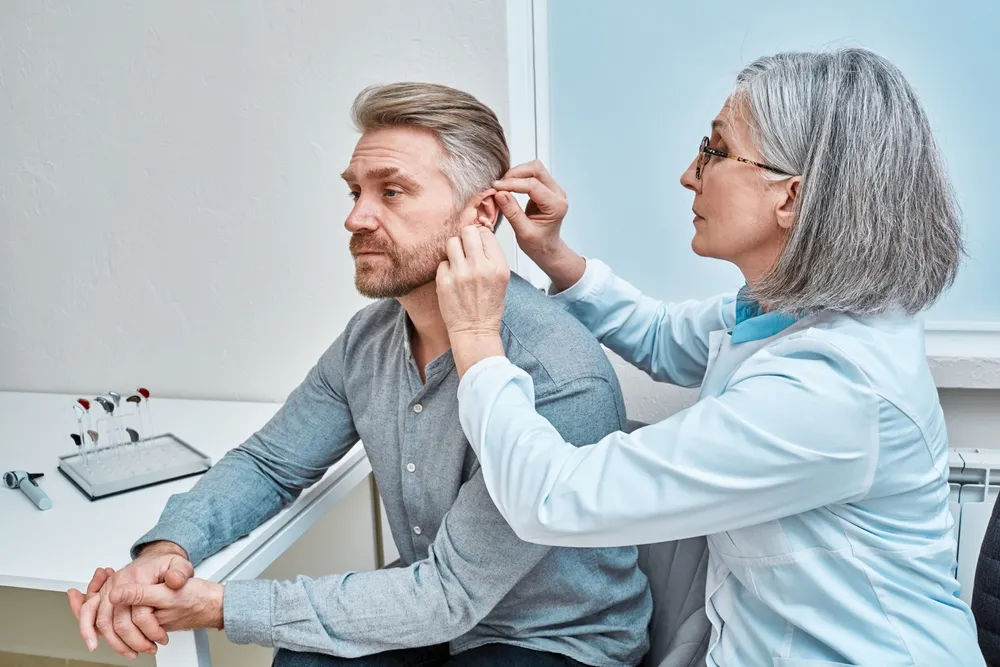Tinnitus is a common condition characterized by hearing noises in the absence of any external sound. It’s estimated that up to 25 million Americans suffer from tinnitus, and it can range from a slight ringing noise to loud roaring. While there is no definitive cure for tinnitus, there are several strategies you can employ to help reduce your perceived ear noise.
Tinnitus can have a significant impact on a person’s quality of life, as the constant perception of noise can be distracting, stressful, and even depressing. If left unmanaged, tinnitus can interfere with sleep, work, and daily activities. Fortunately, there are many options available to help you find relief from your tinnitus. By learning about the different causes of tinnitus and exploring different treatment approaches, you can take an active role in managing your condition and improving your quality of life. Whether you choose to try sound therapy, medication, or a combination of approaches, there is hope for finding relief from tinnitus.

Managing Tinnitus: Key Strategies for Relief
- Tinnitus can result from hearing loss, loud noises, head or neck trauma, certain medications, and stress.
- Keeping a journal of activities and situations that trigger tinnitus helps in managing it.
- Mindfulness, yoga, and deep breathing can help reduce stress-induced tinnitus.
- Protecting ears from loud noises is crucial to prevent worsening symptoms.
- White noise and sound therapy can help mask tinnitus sounds over time.
1. Understand the Causes of Tinnitus
Common Causes of Tinnitus
- Hearing Loss: Age-related hearing loss (presbycusis) and noise-induced hearing loss are the most common causes of tinnitus. Damage to the tiny hair cells in the cochlea can lead to the perception of sounds that are not present in the environment.
- Exposure to Loud Noise: Prolonged exposure to loud sounds, such as those from heavy machinery, concerts, or headphones, can damage the auditory nerve and result in tinnitus.
- Ear Infections and Blockages: Ear infections or blockages caused by earwax, foreign objects, or benign tumors can alter the pressure in your ear and lead to tinnitus.
- Ototoxic Medications: Some medications are known to be ototoxic, meaning they can damage the ear. Common examples include certain antibiotics, diuretics, and high doses of aspirin.
Less Common Causes of Tinnitus
- High Blood Pressure (Hypertension): Elevated blood pressure can increase the force of blood against the inner walls of arteries. This increased pressure can cause a pulsating type of tinnitus known as pulsatile tinnitus, where the sound beats in time with your pulse.
- Temporomandibular Joint (TMJ) Disorders: TMJ disorders can cause tinnitus due to the proximity of the jaw joint to the ear. Issues like jaw misalignment or bruxism (teeth grinding) can exert pressure on the auditory system and result in tinnitus.
- Meniere’s Disease: This inner ear disorder is characterized by episodes of vertigo, hearing loss, and tinnitus. It is caused by abnormal fluid pressure in the inner ear.
- Head and Neck Injuries: Trauma to the head or neck can impact the auditory nerves, blood flow, or brain function related to hearing, leading to tinnitus.
- Acoustic Neuroma: This is a noncancerous tumor on the cranial nerve that runs from your brain to your inner ear. This nerve is responsible for balance and hearing, and its compression can cause tinnitus.
- Blood Vessel Disorders: Conditions like atherosclerosis, arteriovenous malformations, and aneurysms can affect blood flow near the ears, resulting in tinnitus.
- Metabolic Disorders: Conditions such as diabetes and thyroid problems can also contribute to tinnitus by affecting the nervous system and blood flow.
2. Identify Your Triggers
- Make a list of activities and situations that you think may trigger your tinnitus. This could include exposure to loud noises, stress, certain medications, or any other potential triggers.
- Pay close attention to when your tinnitus is most noticeable and try to identify any patterns or commonalities between the times it occurs.
- Keep a journal of your daily activities and note when you experience tinnitus symptoms. This will help you identify any potential triggers for your tinnitus.
- Talk to your doctor about any potential medical causes for your tinnitus and discuss possible treatments or lifestyle changes that may help reduce its severity.
- If you suspect that environmental factors are triggering your tinnitus, take steps to reduce your exposure to loud noises or other potential triggers.
3. Reduce Stress and Anxiety
- Stress and anxiety have been linked to causing or worsening symptoms of tinnitus in some individuals, so finding ways to relax your mind and body can help reduce intrusive ear sounds. Relaxation techniques such as mindfulness meditation, yoga, and deep breathing exercises are all great ways to reduce stress-induced tinnitus symptoms.
- In addition to reducing stress and anxiety, it’s important to take steps to improve your overall quality of life. This includes getting regular exercise, eating a healthy diet, and avoiding loud noises that can worsen tinnitus symptoms.
- It’s also important to be aware of any ear infections you may have as they can cause or worsen tinnitus symptoms. If you suspect an ear infection, see your doctor for treatment as soon as possible. By taking these steps, you can help reduce the impact of tinnitus on your quality of life.
Secure Your Safe Treatment Experience with PennMedicine
Join our satisfied clients who’ve experienced safe, effective treatments.
5. Listen to White Noise

To help mask the noises associated with chronic tinnitus, try listening to nature-based white noise such as waves crashing on a beach or birds chirping during sunrise. This type of sound acts as a distraction against excess thinking or straining due to persistent ear ringing or buzzing noises that can occur with chronic tinnitus episodes.
- Find a comfortable, quiet place to sit or lie down.
- Put on headphones and turn on a white noise track of your choice.
- Adjust the volume until it is at a comfortable level for you.
- Close your eyes and focus on the sound of the white noise, allowing it to fill your mind and block out any other intrusive thoughts or noises that may be present.
- Take deep breaths in through your nose and out through your mouth as you listen to the white noise for 10-15 minutes or longer if desired.
- When finished, slowly open your eyes and take off the headphones before returning to your daily activities.
6. Sound Therapy

Much like white noise therapy helps cover up certain frequencies which may aggravate chronic ear sounds, sound therapy works by delivering masking tone through headphones during long exposures until the brain learns how not to focus on the bothersome sounds of tinnitus anymore.
This results in desensitizing patients over time while providing relief from unwanted symptoms (i.e., decrease distress related to sensory overload).
Instructions for Sound Therapy for People with Tinnitus:
- Find a quiet place to sit or lie down and put on headphones.
- Turn on an Ambient sound therapy track of your choice.
- Adjust the volume until it is at a comfortable level for you.
- Close your eyes and focus on the sound of the white noise, allowing it to fill your mind and block out any other intrusive thoughts or noises that may be present.
- Take deep breaths in through your nose and out through your mouth as you listen to the white noise for 10-15 minutes or longer if desired.
- When finished, slowly open your eyes and take off the headphones before returning to your daily activities.
- Repeat this process daily as part of a behavioral therapy program designed to desensitize people with tinnitus over time while providing relief from unwanted symptoms (i.e., decrease distress related to sensory overload).
7. Dietary Changes & Supplements
Research suggests that certain diet changes may prove beneficial for the reduction of acute and/or persistent ringing ear symptomatology associated with chronic tinnitus.
- Increase your intake of magnesium-rich foods such as nuts, avocados, and legumes.
- Reduce your consumption of processed foods and caffeine.
- Supplement your diet with omega-3 fatty acids.
- Limit your salt intake and increase dark leafy greens like kale in your diet.
- Avoid red meat and opt for lean proteins instead.
- Boost your vitamin C intake by eating fresh citrus fruits & veggies like broccoli & brussels sprouts, etc.
- Introduce probiotics into your diet through yogurt/kefir drinks rich in good bacteria cultures, etc.
- Consider using herbs like ginkgo Biloba (shown in animal studies), etc., to help manage tinnitus symptoms
8. Visit an Audiologist

If all other options fail please visit an audiologist who will be better prepared and qualified than anyone else on this topic given their extensive knowledge about how best to tackle these abiding issues!!
It is also important to note that high blood pressure can worsen tinnitus symptoms, as it can damage the auditory nerve. Therefore, it is essential to keep your blood pressure in check and maintain a healthy lifestyle to reduce the risk of making your tinnitus worse. Additionally, if you are already suffering from tinnitus, it is important to seek medical attention as soon as possible in order to prevent further damage and reduce the impact of tinnitus on your quality of life.
9. Try Natural Remedies
Herbal remedies are known to promote better circulation throughout the body which helps ease some of the stress on your ears causing them to produce seashell-like sounds that can interfere with daily life.
- Consult with your doctor before taking any herbal remedies to ensure they are safe for you to take.
- Purchase Ginkgo Biloba capsules from a reputable health food store or online retailer.
- Take the recommended dosage as indicated on the package, usually one capsule twice daily with meals.
- Monitor your symptoms and adjust the dosage if necessary after consulting with your doctor.
- Consider adding other natural remedies such as zinc, magnesium, and B vitamins to your daily regimen to help reduce tinnitus symptoms.
- Drink plenty of water throughout the day to help flush toxins from your body and keep your ears healthy and functioning properly.
10. Exercise Regularly
Exercise is beneficial in many ways and can help reduce the symptoms of tinnitus by increasing blood flow to the inner ear and improving your overall health and well-being.
- Start by incorporating light to moderate exercise into your daily routine. This can include walking, jogging, biking, swimming, or any other form of aerobic activity that you enjoy.
- Aim for at least 30 minutes of exercise per day, but if you are just starting out it is best to start with 10-15 minutes and gradually increase the duration as you become more comfortable with the activity.
- Make sure to warm up before exercising and cool down afterward to prevent injury and help your body adjust to the physical activity.
- Exercise in a quiet environment if possible as loud noises can worsen tinnitus symptoms.
- Listen to calming music or nature sounds while exercising as this can help distract from any ringing in the ears associated with tinnitus.
- Drink plenty of water before, during, and after exercising to stay hydrated and keep your body functioning properly.
- Speak with your doctor about any specific exercises that may be beneficial for managing tinnitus symptoms such as yoga or Tai Chi which can help reduce stress levels and improve overall well-being.
Making Tinnitus Management a Part of Your Daily Routine
By following a few simple tips every day, you can take control of your tinnitus and find relief. Whether it’s incorporating relaxation techniques into your daily routine, using sound therapy, or seeking the guidance of a medical professional, there are many strategies that can help you manage your tinnitus and get on with your life. Don’t let tinnitus hold you back any longer – start implementing these strategies today and be on your way to achieving long-term control over this troublesome condition.

